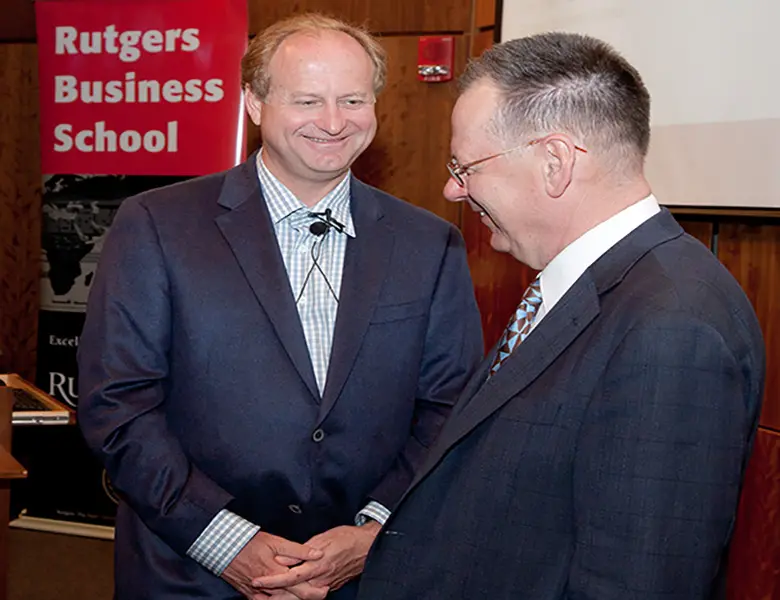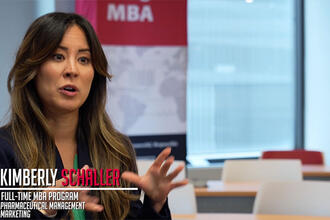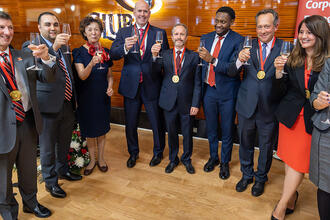
ERIC TVETER IS CEO OF UPC CABLECOM, ONE OF SWITZERLAND'S LEADING CABLE COMPANIES.
Swiss cable executive shares turnaround story, leadership insights during CEO Lecture Series
After Eric Tveter, chief executive of one of Switzerland’s top cable companies, described what was involved in managing a major turnaround, he offered the crowd of Rutgers Business School students at the CEO Lecture Series on April 21 a different sort of wisdom.
On a small white board, Tveter drew two triangles – one upside down on the other – and wrote three words: “Balance work – life.”
"Keeping this in perfect balance,” he said, “requires a lot of thinking.”
It was an illuminating footnote at the end of a 40-minute lecture from the 55-year-old son of Norwegian immigrants who “worked his tail off” on his way to becoming chief executive of an ailing UPC Cablecom in 2009. To an audience of students, alumni and would-be business leaders, Tveter’s exercise reinforced the idea that the climb into the corner office requires values as much as vision.
"Food for thought,” Tveter said he suggested that success was about giving as much as having and a leader’s friends and teams had to be chosen with the same care.
During the talk, Tveter, an alumnus of the Rutgers MBA Program, said one of the things that guided his actions during the effort to get UPC Cablecom back on track was something he refers to as the five C’s of management – communication, culture, commitment, collaboration and customer.
For him, an American, taking the helm of a troubled company in Switzerland where the public has a natural tendency to be skeptical, commitment proved to be particularly vital.
"Commitment is doing what you say you’re going to do,” he said. “We set realistic goals. We under promised and over delivered.”
"You’re not known by the commitments you make,” he added. “You’re known by the commitments you keep.”
Rutgers Business School Dean Glenn Shafer, who introduced Tveter, said his appearance represented the eleventh installment of the CEO Lecture Series. The series has become one of the premier events at Rutgers, showcasing its alumni as well as its ability to provide its students with access to prominent business executives.
Tveter, who completed his Rutgers MBA in 1997, is among a group of alumni who have returned as speakers in the series. Others include Avon Chief Executive Sheri McCoy, Gregory Weaver, who heads Deloitte & Touche, and Gary Cohen, a top executive at medical device-maker BD.

Tveter, who took a job in Europe at 30, has spent his career in the cable industry, moving between European and American companies over more than three decades. At 55, he is as intent on learning German as he is on figuring out a way to turn his company’s customers into fans – like the ones hooked on Apple and its iPhones.
Before his lecture began in Bove Auditorium, Tveter, who grew up in New York and received his Rutgers MBA in 1997, spoke with Rutgers Business School about his management style, the challenges of taking UPC Cablecom to the next level and the Formula One driver whose career he is closely following.
Q: How would you describe your management style?
A: "Management style, leadership style needs to be adapted to the situation. During my career, I’ve been called a Democrat and a dictator. In a turnaround situation, in particular, when you’re managing through a crisis, sometimes you have to be dictatorial whereas when you’re in a less intense situation, the opportunity to build consensus and have more participatory approach to management and leadership is possible.”
Q: What have you drawn on to develop your own management style?
A: "There’s a great old saying that good judgment comes from experience and experience comes from bad judgment. You learn from your mistakes. I am not a natural orator, and am more introverted than extroverted. As a leader, you just have to be yourself and try to inspire people to work together to achieve whatever the goal is. There’s another saying that I use quite a bit, common sense should be common practice. If you work as part of a team, trying to be pragmatic and finding solutions together is always the best recipe for success.”
Q: You’ve talked about wanting to differentiate UPC Cablecom and turn it into a company customers will love. What inspired that goal and how do you carry it out?
A: "In the next five years, we’re very much raising the bar, trying to get to the next level to become a beloved company. There are very few companies that I would say are beloved or, in another word, loved. Apple is an example of a company that people have an emotional connection with their devices. I’ve been using Apple products since the 80’s and I love Apple products and services. So, that’s an inspiration for me in terms of what we want to do. I think we have to shift from trying to emulate our competitors and just become better than them in specific aspects of how we act. That will set us apart in the marketplace.”
Q: Can you give us an example of what you would do differently?
A: "That’s the challenge for us. We’re in the midst of workshops across the company trying to generate ideas on how to change the way we operate. At the end of the day, it’s a team of people who are going to come up with some ideas, and we’re going to take the best ones and try to execute them. For example, five years ago, we decided that delivering a device twice as fast was something unique because it normally took three to five days for our competitors to deliver a device. Then a few years ago, we were able to deliver in one day, which is best in class. More than that, we want to find a way to create more of an emotional connection with our customers. That’s going to be a challenge, but there are lots of good ideas that are being put together by a lot of smart people.”
Q: How did getting an MBA help you in your career?
A: "The most important thing I learned in the MBA Program at Rutgers was working with a team of people. At the time, I was in an inter-functional management program. We worked as a team to solve a problem for a company. We did that collectively under the leadership of a former executive from McGraw Hill, John Cave. That gave us some practical experience in problem solving. When people ask me what my job is as a CEO, it’s simple, it’s solving problems every day. It’s bringing people together to solve those problems. That’s the most simplistic description of what a CEO does.”
Q: You mentioned you have an interest in Formula One racing. Can you tell us a little bit about the driver you’re following closely?
A: "The driver I follow is my son Ryan who developed a passion for motor sports at a very young age. We never really did anything to encourage it, but from the time he was a very little boy, he wanted to be in racing. When he was at boarding school, through a friendship, he got a test with a team in a Formula BMW and since then he has pursued racing. He graduated from Choate Rosemary Hall. He did some time at university and now, he’s got a gap year to pursue his dream. We’re very proud of him. He’s doing quite well. He had his first podiums this past winter in New Zealand, and he’s in the midst of starting the European season in Renault World Series Eurocup 2.0. He’s 19 years old. I admire the fact that he’s pursuing his passion. He’s getting a great practical education in the sense of you fail more than you win in racing. You have to develop a lot of mental toughness and you have to be exceptionally physically fit and mentally sharp.”
-Susan Todd
Press: For all media inquiries see our Media Kit


